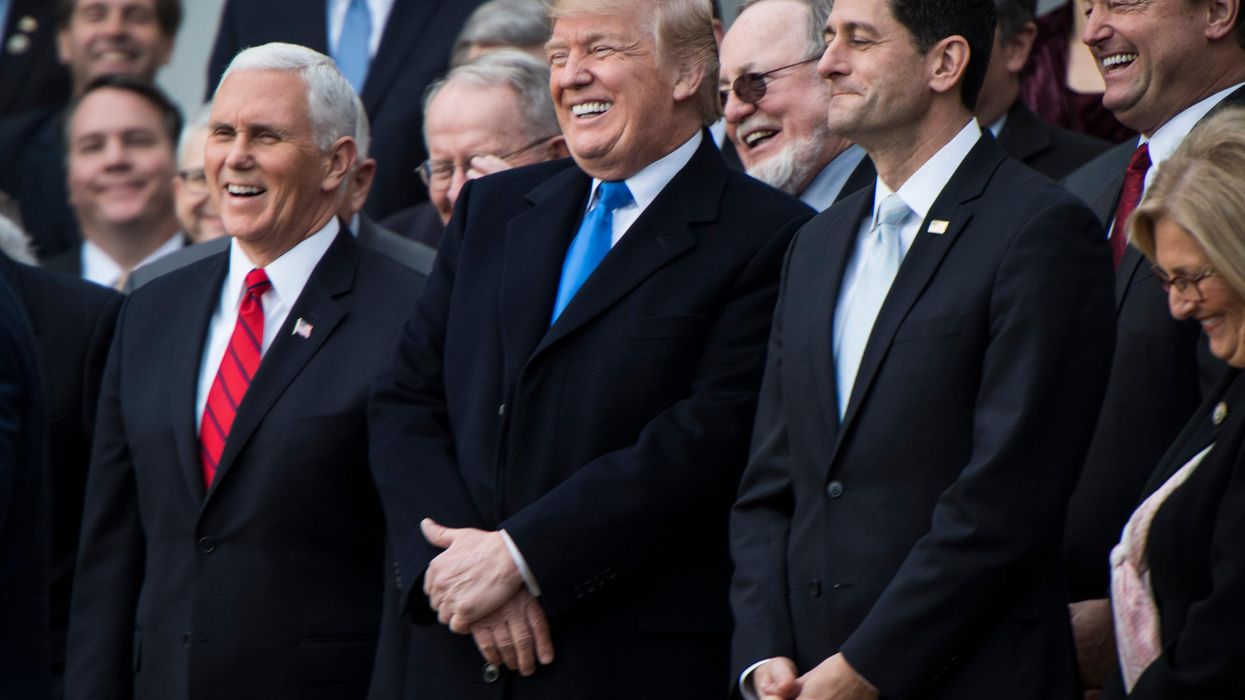It was a lie, but it wasn’t the first time the GOP had tried that lie. Then knew exactly what they were doing, and what outcome it would produce. Instead of raising the pay of their workers, the rich people on the receiving end of Reagan’s, Bush’s, and Trump’s tax cuts simply added the cash to their money bins and investments, bought new yachts or trophy wives, and blasted themselves into outer space on penis-shaped rockets.
Thankfully, the Biden administration and this generation of Democratic politicians have rejected Reagan’s neoliberalism and low-tax ideology in favor of what centuries of history shows us works: for the wealthy to again pay their fair share of taxes to sustain the commons.
Nonetheless, Republican politicians think we haven’t noticed and they’re trying to pull it off again at both the state and federal level. A bill with 102 GOP co-sponsors (the Tax Cuts and Jobs Permanency Act) is in motion in the House of Representatives right now to double-down on Trump’s tax cuts.
How did we get here, and why are they still pushing something that’s so discredited it’s become a punch-line for late-night comedians?
The GOP was captured by the morbidly rich in the 1880s and has been dancing to their tune ever since, regularly throwing bones to bigots, religious zealots, womanhaters, and gun nuts to get enough votes to hold power.
Ever since that era, their main focus has been to increase the wealth of the morbidly rich while keeping down wages and saddling average people with as much debt as possible. As I’ve explained before, conservatives believe this crushing of the middle class is the best way to “ensure social stability” and thus “save America.”
The first Democratic president to call Republicans out for that era’s version of trickle-down economics (which back then, before income taxes, had to do with suppressing wages, fighting the early union movement, and letting industrial oligarchs wipe out small competitors) was Grover Cleveland, in his 1888 State of the Union speech:
As we view the achievements of aggregated capital, we discover the existence of trusts, combinations, and monopolies, while the citizen is struggling far in the rear or is trampled to death beneath an iron heel. Corporations, which should be the carefully restrained creatures of the law and the servants of the people, are fast becoming the people’s masters.
But the first tax on wealthy Americans went into place way before that, in 1839, shepherded through Congress by Representative Abraham Lincoln. It was a tax on luxury items and expensive land exclusively owned by rich people. As Lincoln wrote to his friend William Wait on March 2, 1839:
I believe it can be sustained, because it does not increase the tax upon the “many poor” but upon the “wealthy few”… [which] by taxing [luxuries and land], as is well known, that belong, not to the poor, but to the wealthy citizen.
On the other hand, the wealthy can not justly complain, because the change is equitable within itself, and also a sine qua non to a compliance with the Constitution. If, however, the wealthy should, regardless of the justness of the complaint, as men often are, when interest is involved in the question, complain of the change, it is still to be remembered, that they are not sufficiently numerous to carry the elections.
Lincoln followed up as president with the nation’s first income tax in 1861, put into place to fund the Civil War. It was also a progressive tax; it only hit people who made above $800 ($32,000 today).
However, taxing the rich to pay for the needs of the nation was also an idea that long predated even Lincoln. As former President Thomas Jefferson wrote to Pierre Samuel Du Pont de Nemours in 1811:
We are all the more reconciled to the tax on importations, because it falls exclusively on the rich, and, with the equal partition of intestate’s estates, constitute the best agrarian law. In fact, the poor man in this country who uses nothing but what is made within his own farm or family, or within the U.S. pays not a farthing of tax to the general government, but on his salt; and should we go into that manufacture, as we ought to do, he will pay not one cent.
Our revenues once liberated by the discharge of the public debt, and its surplus applied to canals, roads, schools, etc., and the farmer will see his government supported, his children educated, and the face of his country made a paradise by the contributions of the rich alone without his being called on to spare a cent from his earnings. The path we are now pursuing leads directly to this end which we cannot fail to attain unless our administration should fall into unwise hands.
Following Cleveland’s calling out of the morbidly rich of his day, late 19th-century advocates for that class came up with the “horse and sparrow” theory of taxation. This was back in the day when everybody used horses for transportation and people were used to seeing small birds pecking undigested grain from the horses’ droppings that filled America’s streets.
The sales-pitch was that if you fed horses extra oats, more than they could normally digest, they’d pass through all that undigested oat into their manure for the sparrows to pick at; rich people’s excesses, in other words, would spill over to the average “sparrow” working person. It was embraced by Republicans in Congress and not only didn’t it work; it was blamed, in part, for the Panic of 1896.
Republican Warren Harding revived Horse and Sparrow economics in 1920 (many people still owned horses) when he campaigned on dropping the then-91% top income tax bracket down to 25%. He was elected and kept his promise, the result being the “Roaring 20s” when the rich got fabulously richer while working people saw their wages actually drop (leading to an explosion of unionization efforts by pissed-off workers that were violently suppressed by employers and police).
It all came to a startling and final end in October, 1929 with the Great Crash that set off what was then called the Republican Great Depression (the “Republican” part of that label largely wore off after the election of Republican President Dwight Eisenhower in 1952).
Republicans stopped talking about horses and sparrows around that time, but the theory never really died; Reagan simply reinvented it in 1980 as “Supply-Side Economics,” aka trickle-down.
Today, Republican politicians—heavily supported by right-wing billionaires since five Republicans on the Supreme Court legalized political bribery—are trying their best to revive their nonsensical horse-and-sparrow trickle-down rationale so the rest of us can pay to make the rich far richer. Trump promises to renew his expiring tax cuts for billionaires if he’s elected, which the Congressional Budget Office (CBO) says will add another $4.6 trillion to the $7 trillion deficit he gave us during his four years in office.
In Kansas, Republican legislators keep pushing through new tax cuts for the rich (one would reportedly cut Charles Koch’s tax bill this year by almost a half-million dollars) and Democratic Gov. Laura Kelly keeps vetoing them. Republican legislatures in Wisconsin and Pennsylvania just passed tax cuts for the wealthy totaling $2 billion and $3 billion respectively, although both states have Democratic governors who will veto such legislation.
In Mississippi, however, Republican Gov. Tate Reeves and his GOP colleagues in that state’s legislature have radically and repeatedly cut taxes, threatening to eliminate the income tax (which produces a third of the state’s revenue) altogether. Rich Mississippians will be fine; the necessary cuts will fall on the poor and the state’s educational and physical infrastructure, which are not much used by the very wealthy who fund Reeves anyway; they send their kids to private schools and fly private jets.
Other Republican-controlled states are seeing similar actions to raise taxes and fees on working class people while cutting taxes on the morbidly rich. Georgia’s Republicans just cut state taxes by a billion dollars; North Carolina reduced their income tax on the richest from 5.5% to 3.99%; and Iowa is trying to transition to a flat tax so that even the poorest of workers must pay the same tax rate as that state’s most wealthy, who will see a huge tax cut.
Altogether, The Center on Budget and Policy Priorities notes, just between 2021 and 2023:
Twenty-six states cut their personal income tax rates and/or corporate income tax rates, 13 of them multiple times… Combined, the cuts will cost those 26 states an estimated $124 billion by 2028, including $13 billion that they have already lost (2022-2023) and $111 billion over the next five years (2024-2028)… This 3.6% share is equivalent to more than a third of states’ general fund spending on higher education and more than half of what goes to state correctional systems.
Thankfully, the Biden administration and this generation of Democratic politicians have rejected Reagan’s neoliberalism and low-tax ideology in favor of what centuries of history shows us works: for the wealthy to again pay their fair share of taxes to sustain the commons.
As President Joe Biden told an audience just last week:
We’ve gone from trickle-down economics to the point where we’re in a situation where we build from the middle class out and the bottom up. And that way the wealthy still do very well. No one wealthy is hurting at all. We’re in good shape. So, we have to keep it going that way.
Republicans have been hustling this scam for over 150 years, and in the states they control educational outcomes are plummeting, child and infant mortality is skyrocketing (along with homicides), and infrastructure threatens to disintegrate as funding cuts come online.
Nonetheless, it finally seems Americans are catching on and increasingly rejecting horses, sparrows, and politicians who try to sell them on more trickle-down tax cuts for the rich.
More Americans need to know this history. Pass it along.


